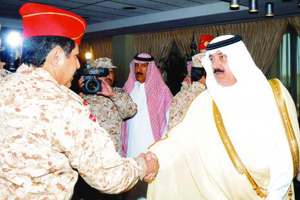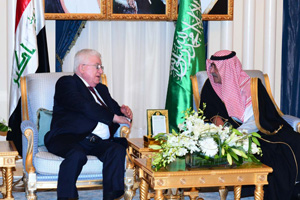The Minister of the Saudi Arabian National Guard, HRH Prince Mit`eb bin Abdullah bin Abdul-Aziz Aal Saud, arrives in Washington, D.C. this week on a much anticipated visit to discuss Saudi Arabian-American relations at a time of great uncertainty in the Middle East.

Prince Mit`eb bin Abdullah receives senior Saudi Arabian National Guard officers during a reception in Riyadh. Photo: Saudi Press Agency.
Among the most prominent members of the Saudi royal family, Prince Mit`eb will re-affirm Saudi Arabian-American ties but will also bring a unique perspective on the dangers of the Islamic State in Iraq and Syria (ISIS), the continuing Syrian civil war, the uncertainties in Iraq’s future, and the threat of an expanding Houthi movement in Yemen. Indeed, his visit is likely to be a defining event in Saudi Arabian-U.S. relations and an important occasion to address the implications of potential developments in the Arabian Gulf, the Arab world, and the Middle East as a whole.
ISIS and the Syrian Civil War
Foremost among Prince Mit`eb’s concerns will naturally be the presence of ISIS fighters close to the Saudi Arabian-Iraqi border. The Islamic State has wrested control of Iraq’s Anbar Province in the southwest from the Iraqi army and is threatening to attack the capital Baghdad. Both developments present major challenges to the kingdom’s and the Arabian Peninsula’s strategic posture. While Riyadh has succeeded in the last decade-and-a-half in stanching the domestic threat represented by al-Qaeda in the Arabian Peninsula, it obviously remains wary of the extremists’ external peril, which is even more ruthless and barbaric this time around.
Moreover, as the preeminent Muslim state in the international anti-ISIS coalition challenging the Islamic State’s use of Islam as justification for war and destruction, and the most powerful member in the Gulf Cooperation Council, Saudi Arabia expects to lead a vigorous response to ISIS’s threats.
It is thus quite possible that Prince Mit`eb will discuss with American officials ways to cooperate militarily and logistically to face down the present challenge to the kingdom’s and the Arabian Peninsula’s northern borders.
Prince Mit`eb’s visit will also provide an opportunity to clarify respective American and Saudi Arabian positions regarding Syria and to consider possible ways to increase cooperation on different aspects of that country’s grinding civil war. As the Islamic State and the al-Qaeda-aligned Al-Nusra Front continue to make gains on the battlefield in Syria, the Saudi Arabian-U.S. plan requires re-thinking and re-calibration. The size of the force of moderate Syrians to be organized and equipped (originally envisioned at 5,000 soldiers), the pace of their training and insertion into Syria, and their future maintenance and strengthening will obviously be on the agenda in any discussions.
What is clear, however, is that the prince will seek clarification of the U.S. Administration’s agenda and policy towards Syria with a view to obtaining a clearer commitment to the ouster of Syrian President Bashar al-Asad and ending the influence of the Islamic Republic of Iran in that country.
The Inertia in Iraq and the Houthi Threat

Saudi Arabian Deputy Crown Prince Muqrin bin Abdulaziz Al-Saud hosts Iraqi President Fuad Masum. Photo: Saudi Press Agency.
As Iraq’s new government of Haidar al-Abadi continues to take only tenuous and small steps toward changing official policies affecting the country’s Sunni communities, Prince Mit`eb is most likely to prod American officials to exert necessary pressure on Baghdad to give Sunni Iraqis what has been their due for more than a decade.
Such redress could go a long way in fighting ISIS in Iraq. Moreover, the prince will likely seek greater assurance of securing Iraq’s sovereignty, political independence, and territorial integrity; the former in order to limit Iranian and Turkish interference in Iraqi affairs and the latter to secure Iraq’s unity and prevent its partition, an outcome that would be a harbinger of more, and destructive, geographical engineering in the Levant. Saudi Arabia is not alone in believing that an independent, unified Iraq will be the best hope for its different communities and for the stability and security of the entire eastern Mediterranean region and area to the immediate north and west of the GCC countries.
Importantly, Prince Mit`eb will raise grave concerns about the gains the Houthis have secured in Yemen and may ask for American assurances in ameliorating the impact of their possible control of the eastern shore of the lower Red Sea and the Bab al-Mandab Strait. For Saudi Arabia, the Houthis’ success in controlling Sanaa and its political process is a direct threat since it allows for a significantly heightened Iranian sphere of influence on its southwestern corner.
Moreover, the Houthis’ success has allowed for Yemen to become the latest ring in a chain of Iranian encirclement running through Iraq, Syria, and Lebanon. A member of the Iranian parliament, Ali Reza Zakani, who is also close to the Iranian Supreme Leader, Grand Ayatollah Ali Khamenei, gloated that Iran now controls four Arab capitals -Baghdad, Beirut, Damascus, and Sanaa. In 2009, Saudi Arabia fought the Houthis when they crossed into its territory and attacked its forces and positions. Any renewal of this incursion now will obviously be seen by the kingdom as an Iranian effort to destabilize it and may lead to outright Saudi Arabian intervention in Yemen.
Finally, the prince’s visit to Washington comes as American-Iranian nuclear negotiations in Oman appear to have failed to reach an acceptable outcome. If not reversed by the end of the current round of negotiations on November 24, and despite the possibility of extending the deadline, the lack of success will necessarily mean a continuation of present tensions with Iran and possibly an intensification of the Islamic Republic’s exploitation of current crises to its strategic advantage. For this reason, Saudi Arabia is hard-pressed to present its case regarding apprehensions about Iran to the United States and Prince Mit`eb is a key interlocutor who understands both the limitations of Saudi Arabia’s capabilities and America’s ability to redress them.
*****************************
Dr. Imad Kamel Harb is a Distinguished International Affairs Fellow with the National Council on U.S.-Arab Relations, a non-profit, non-governmental, educational organization in Washington, DC.

You must be logged in to post a comment.